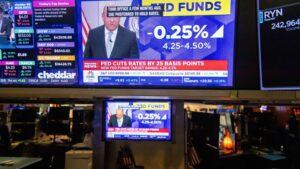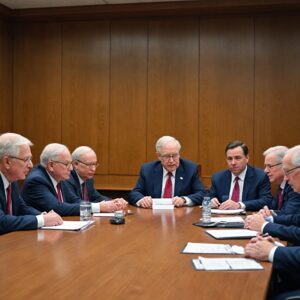Highlights:
– ETF market speculation on the impact of the Trump presidency post-election
– Potential beneficiaries of Trump policies in sectors like banks, energy, and crypto
– Uncertainty in the bond market and potential impact of tariffs on ETFs
ETF Market Speculation Post-Election
With the recent elections concluded, the focus in the ETF world has shifted to how the outcomes will shape the industry under a renewed Trump presidency. Expectations around potential tax cuts, regulatory changes, and increased tariffs have stirred conversations about which ETFs investors may favor in the coming years. Sectors like banks and energy have come under the spotlight as potential beneficiaries of Republican policies. The buzz around these expectations has influenced investor behavior towards specific ETFs that traditionally thrive under such conditions.
Key figures in the ETF community, such as Tom Lydon and John Davi, have highlighted the sectors likely to see increased investor demand. ETFs specializing in banks, small caps, industrials, cyclicals, non-Mag 7 stocks, and even cryptocurrencies have been touted as potential beneficiaries of Trump’s policies. The evident shift in investor sentiment is visible in the market, with significant inflows into ETFs like the SPDR Regional Bank ETF post-election, pointing towards a positive outlook for banks under reduced regulatory oversight and potential inflationary fiscal policies.
Impact on Bond Market and Crypto ETFs
While optimism surrounds sectors like banks and energy, the fixed income market appears shrouded in uncertainty. Varying perspectives on treasuries and bonds have sparked discussions on asset allocation strategies, with some voices cautioning against heavier reliance on bonds given the prevailing economic indicators. The division in opinions is reflective of the broader market sentiment, with contrasting views on the efficacy of treasury ETFs in the current economic landscape.
On the other end of the spectrum, the meteoric rise of crypto ETFs has been a standout feature in the investment landscape post-election. The influx of assets into crypto ETFs since January underscores the growing popularity of digital assets among investors. As regulatory dynamics evolve under the Trump administration, the future trajectory of crypto ETFs remains intriguing, especially with the potential paradigm shift in regulatory oversight favoring broader legislation that could enhance the crypto market’s legitimacy.
Implications of Tariffs and Downside Risks
The specter of tariffs and trade protectionism looms large over international ETFs, with exposure to markets like China and Mexico potentially facing market volatility. Consumer discretionary ETFs, reliant on imported goods, could encounter challenges amid potential cost escalations due to tariffs. The interplay of geopolitical factors like tariffs underscores the nuanced dynamics influencing ETF performance across different sectors.
Additionally, the downside risks associated with tariffs are not limited to international markets but could also impact domestic sectors like industrials. While these sectors may face headwinds from increased tariffs, the cyclical nature of industrial stocks could mitigate some of the negative effects. Navigating the uncertainties arising from tariff policies and their impact on various ETFs will be a critical consideration for investors as they fine-tune their portfolios to adapt to changing market conditions.
In conclusion, the ETF landscape post-election presents a blend of opportunities and challenges, with sector-specific nuances shaping investment decisions. The evolving regulatory landscape, coupled with shifting geopolitical dynamics, underscores the need for a nuanced approach to ETF investing. As investors navigate the intricacies of post-election market trends, the resilience of ETFs in adapting to changing paradigms will be a crucial factor in shaping future investment strategies.
What potential opportunities do you see emerging in the ETF market post-election?
How might regulatory changes under a renewed Trump presidency impact the broader ETF industry?
Which sectors do you believe will be most resilient to the uncertainties stemming from tariff policies in the current economic climate?
The content is provided by Jordan Fields, Financial Pulse Now























